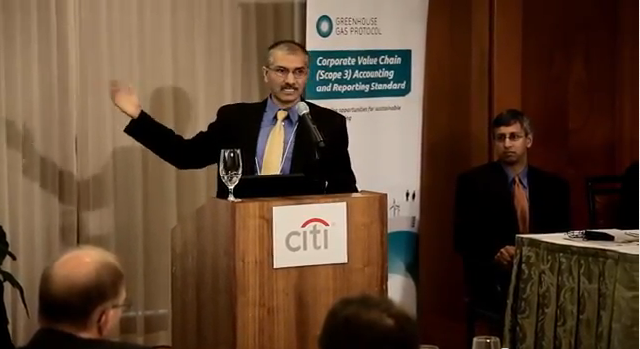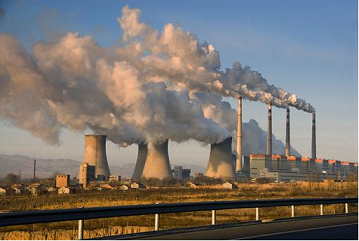Blog
Launch of The Greenhouse Gas Protocol for the U.S. Public Sector
The Greenhouse Gas Protocol for the U.S. Public Sector was released today by the GHG Protocol Initiative and LMI. The protocol outlines how federal, state and local governments can account for their greenhouse gas (GHG) emissions.
Mexico Bases Climate Change Strategy on GHG Program
The Mexican government has adopted a new national climate change strategy that identifies the GHG Protocol-based Mexico GHG Program as the basis of a step-by-step approach to climate change mitigation.
New EPA Rule Establishes Mandatory Greenhouse Gas Reporting
EPA is creating a nationwide database of greenhouse gas emissions, an important first step on the path to reducing U.S. emissions. The plan would require 13,000 facilities to report their emissions.
Video: Leading Companies Use New Standards to Uncover Greatest Sources of Carbon Emissions
Last week’s Rio+20 conference failed to yield strong sustainability commitments from corporations. The gap between where we need to get to avoid climate change’s worst effects and the actions companies are willing to take to get us there have never been further apart.
New Guidelines on Supply Chain and Lifecycle Greenhouse Gas Accounting and Reporting in Planning Process
Program Based on U.S. EPA's Climate Leaders to be Launched in India
Since its creation in 2002, the U.S. EPA Climate Leaders Program has assisted more than 150 companies to develop and implement long-term climate change strategies. This includes developing a GHG inventory, an inventory management plan, and a GHG reduction target. To replicate the U.S. EPA Climate Leaders Program's successful model in India, WRI, U.S. EPA and the Confederation of Indian Industry (CII) Green Business Center (GBC) are partnering together to replicate the Climate Leaders program there.
Listening to Hurricane Sandy: Climate Change is Here
LCM 2011, Berlin, Germany
WRI’s GHG Protocol Director, Pankaj Bhatia, delivered a keynote address on the new GHG Protocol Supply Chain Standards at the Life Cycle Management (LCM) Conference 2011. The Life Cycle Management conference series is one of the world’s leading forums for environmental, economic and social sustainability.
Open Comment Period for Agriculture Guidance
GHG Protocol has released a second draft of its Agricultural Guidance for open comment. The Agricultural Guidance is an international supplement to the GHG Protocol Corporate Standard that aims to customize the latter to the agricultural sector, while addressing the unique challenges posed by the sector - accounting for reversible carbon stocks in soils and biomass, setting and tracking progress toward reduction targets against a background of highly variable emissions, quantifying emissions, etc.
Otarian Restaurant in New York City Uses WRI’s Greenhouse Gas Protocol
On the evening of April 14th, WRI filled a role not normally reserved for environmental think tanks: VIP guest at a high-profile New York restaurant opening. Otarian, now open in New York City’s West Village, is a new boutique fast-casual restaurant chain based on the principles of sustainability and vegetarianism. Otarian is also the first global restaurant chain to track the carbon footprint of all of its menu items.
Program Officially Transitions from Pilot Phase to Headquarters at SEMARNAT
The Mexico GHG Program officially transitioned from a pilot project to a permanent program on October 2, marking a significant milestone for the program partners and 30 par
Launch of the GHG Protocol Product Life Cycle and Corporate Value Chain Standards
On October 4th the GHG Protocol launched the new Product Life Cycle and Corporate Value Chain Standards with events in New York City and London. The global press launch of the Standards in New York City occurred in conjunction with WRI’s Corporate Consultative Group (CCG) fall meeting. CCG is a group of 150-200 representatives of large corporations, mainly sustainability managers, who are coming to engage with WRI experts – and with each other – to access environmental intelligence in order to protect and grow shareholder value and steer business to better protect the environment.
LULUCF Performance Standard Approach Met with Enthusiasm at Nairobi Launch
Project developers are concerned that high transaction costs and uncertainty around the acceptance of projects by governing bodies is limiting the number of projects being developed in Africa and around the world.
Looking Back on 15 Years of Greenhouse Gas Accounting
By Stephen Russell
First International Workshop of GHG Protocol-Based Programs
New developments are driving the need for GHG accounting programs around the world to evolve more efficiently, more effectively, and at a greater scale. On the business side, there is a trend toward managing GHG emissions along the value chain. Companies are looking up and down the supply chain and throughout the product life-cycle for GHG management opportunities. As climate policy becomes a reality in industrialized and developing countries around the world, many emerging economies are adopting voluntary national GHG mitigation targets and identifying the policies and measures to best achieve them. These trends point to the need for greatly enhanced GHG accounting capacity and tools at a global scale to ensure that mitigation actions can be measurable, reportable and verifiable.
Invitation to Inform New Initiative on GHG Mitigation Accounting
WRI is considering developing new guidance to help government agencies, civil society organizations, and others address the question, “What effect are policies expected to have on GHG emissions?”
Inventários de Emissões de Gases de Efeito Estufa para Cidades - GPC
O programa GHG Protocol do World Resources Institute – WRI pretende contribuir com o esforço coletivo mundial em busca de uma economia resiliente e do equilíbrio climático do planeta. Para isso, desenvolve ferramentas de apoio à contabilização e reporte de emissões de GEE, como o GHG Protocol para empresas, reconhecido e adotado mundialmente.
Invitation to Comment: Proposed Addition of Gases Reported with GHG Protocol Standards
GHG accounting is not a static field and the GHG Protocol is constantly reviewing its publications to ensure they properly reflect the science on climate change and continue to define best practices for GHG accounting and management. One area the GHG Protocol monitors is the best available scientific evidence regarding the importance of individual GHGs, as evaluated by the Intergovernmental Panel on Climate Change (IPCC) and as reflected in the guidelines of the United Nations Framework Convention on Climate Change (UNFCCC) for national GHG emissions reporting.
Launch of Beta Version of GHG Emissions Calculation Tool for Chinese Coal Fired Power Plants
At a May 29 launch event in Beijing, WRI introduced the GHG Emissions calculation tool for Chinese Coal-Fired Power Plants to an audience of about 100 participants. The tool will enable Chinese power companies to establish a GHG emission inventory of its operations and prepare for GHG emissions management and reduction.








